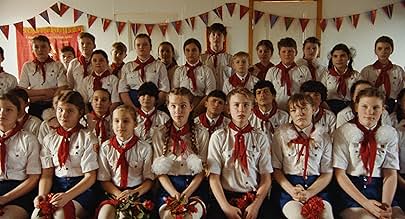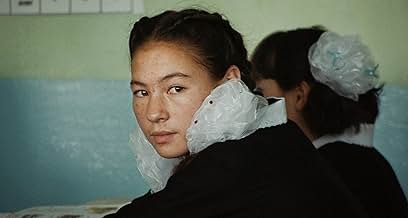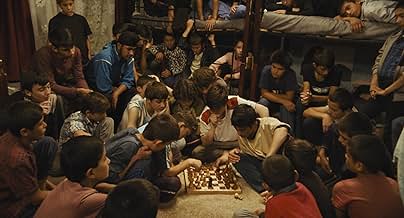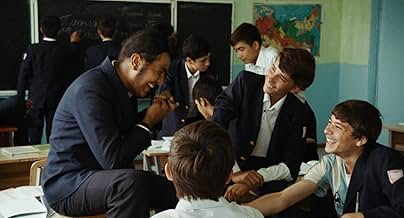A 15-year-old ticket scalper in Kabul dreams of Bollywood until the Soviets force him into a state facility.A 15-year-old ticket scalper in Kabul dreams of Bollywood until the Soviets force him into a state facility.A 15-year-old ticket scalper in Kabul dreams of Bollywood until the Soviets force him into a state facility.
- Awards
- 1 win & 7 nominations total
- Director
- Writer
- All cast & crew
- Production, box office & more at IMDbPro
Featured reviews
Wonderful, a six-handed production (countries) that social criticism we love, bathing in history, a sad time the takeover of Afghanistan by the Soviets, called the War in Afghanistan (1979-1989), and the outcome, the film, could not to be different, the tragedy, the sadness, the defeat, and the interrupted ending, of the unspoken drama...
Innovative and delicate film on the lives of poor boys in Afghanistan who have been sent to an orphanage. Through their eyes spectator sees dramatic changes in Afghanistan, from Soviet influence until the emergence of religious fundamentalism. The movie does not avoid the serious particular problems of each moment. Besides the social and political issues, I shall also highlight that the main character among those boys used to illegally re-sell movie theatre tickets, and loves cinema. Therefore, one of the most special elements of the film is how, during harsh episodes, his mind brings back the Bollywood scenes he loves in a way of making reality nicer and softer in a day-dreaming illusion.
The film is about a kid named Qodratullah who is forced to live in an orphanage by the pro-Soviet government of Afghanistan in 19189 Kabul. As soon as he arrives in the orphanage which is around 10-15 minutes in, the director lifts her focus and camera from the kid and tries instead to capture every elements in that place such as the kids, the dorms, the teachers and supervisers and so on.
This film is made based on unpublished diaries of Mr. Anwar Hashimi who also stars in this film and he lived in such a place for 8 years when he was a teenager. As a result, the main focus and star of this film is the mentioned orphanage and director Shahrbanoo Sadat reflects on Afghans culture and the country's political state at that time period as a subplot to the life in the orphanage.
The filmmakers have done their best to give us a human, sans cliche film and they have pretty much succeeded doing so. If you've got a chance to see this piece, don't miss it.
This film is made based on unpublished diaries of Mr. Anwar Hashimi who also stars in this film and he lived in such a place for 8 years when he was a teenager. As a result, the main focus and star of this film is the mentioned orphanage and director Shahrbanoo Sadat reflects on Afghans culture and the country's political state at that time period as a subplot to the life in the orphanage.
The filmmakers have done their best to give us a human, sans cliche film and they have pretty much succeeded doing so. If you've got a chance to see this piece, don't miss it.
Pros:
1. The dialogue is incredibly grounded and genuine, thus giving the conversations an air of realism to the adolescent boy interactions.
2. The cinematography is gorgeously scaled-back, again adding to the realistic feel.
3. The short intermittent sing-a-long scenes in Hindu-Urdu are exceedingly entertaining, bizarre, and eye-popping.
4. The film does a great job at highlighting the similarities between The West and pre-Mujahideen Afghanistan.
Cons: 1. The movie is needlessly slow-paced and, at times, is a little bit of a chore to get through. 2. Most of the characters are unspeakably plane and uninteresting, with nothing to them (the exception being Qodrat (Quodratollah Qadiri) as he's shown to be thrifty, however that trait is shown early on and is then forgotten about). 3. The acting is generally really stale and uninspiring. 4. The script is unfocused, disjointed, and it often feels that the scenes are just jumping from one-to-the-next with little coherence. 5. There are copious sub-plots introduced, and then carelessly discarded with no resolution. With examples being, Qodrat's possible love interest, or the Russian military presence and Russian diplomatic ties to pre-Mujahideen Afghanistan. 6. The ending death of Anwar (Anwar Hashimi) falls resolutely flat as he's barely a character, and the death isn't set up at all. It also doesn't help that there's this strange sing-and-fight sequence straight after.
Cons: 1. The movie is needlessly slow-paced and, at times, is a little bit of a chore to get through. 2. Most of the characters are unspeakably plane and uninteresting, with nothing to them (the exception being Qodrat (Quodratollah Qadiri) as he's shown to be thrifty, however that trait is shown early on and is then forgotten about). 3. The acting is generally really stale and uninspiring. 4. The script is unfocused, disjointed, and it often feels that the scenes are just jumping from one-to-the-next with little coherence. 5. There are copious sub-plots introduced, and then carelessly discarded with no resolution. With examples being, Qodrat's possible love interest, or the Russian military presence and Russian diplomatic ties to pre-Mujahideen Afghanistan. 6. The ending death of Anwar (Anwar Hashimi) falls resolutely flat as he's barely a character, and the death isn't set up at all. It also doesn't help that there's this strange sing-and-fight sequence straight after.
The Orphanage is a stellar film conveying the need for true heartfelt cinematic experiences. Beautiful cinematography creates a transcendent movie experience, with a script based on the unpublished diaries of Anwar Hashim, who plays a supporting role in the film. Acclaimed director Shahrbanoo Sadat uses personal experiences to convey an uplifting message.
Wolf and Sheep, the prequel to The Orphanage, premiered in 2016. Like its predecessor, The Orphanage is based on real life experiences in Afghanistan. The movie chronicles the main character, Qodrat (Qodratollah Qadiri), who spends his days trying to survive by illegally selling overpriced movie tickets and key rings. He is then brought to a Russian-operated orphanage along with other teenage boys, where he is given the opportunity to get an education alongside his peers. The Orphanage details his experiences in the orphanage and how the quarrels between roommates of the dorms are dealt with by the director Anwar (Anwar Hashimi). All throughout a war torn country in 1989, Qodrat remains hopeful, through fantasy sequences shared with the audience.
The cinematography is what truly stands out in this film. Directory of photography, Virginie Surdej captures the beauty of the country while adding to the heartbreaking story. My favorite part of this movie is the performances by the young people, including Qodratollah Qadiri, who gives rare insight into real life in Afghanistan, as they are all natives of the country.
The message of this film is about the importance of hope, despite all circumstances. The protagonist, Qodrat, remains hopeful and looks for positive routes of escapism throughout his struggles of growing up without a family, and his struggles at the orphanage. You should be aware that the film contains strong language and minor adult content. There are also two graphic descriptions of war and violence. There is also some references to sex and pornographic images (very far away from the screen, but still visible) that are unsuitable for younger kids.
I give The Orphanage 4 out of 5 stars and recommend it for ages 15 to 18, plus adults. Reviewed by Erin M., KIDS FIRST!
Wolf and Sheep, the prequel to The Orphanage, premiered in 2016. Like its predecessor, The Orphanage is based on real life experiences in Afghanistan. The movie chronicles the main character, Qodrat (Qodratollah Qadiri), who spends his days trying to survive by illegally selling overpriced movie tickets and key rings. He is then brought to a Russian-operated orphanage along with other teenage boys, where he is given the opportunity to get an education alongside his peers. The Orphanage details his experiences in the orphanage and how the quarrels between roommates of the dorms are dealt with by the director Anwar (Anwar Hashimi). All throughout a war torn country in 1989, Qodrat remains hopeful, through fantasy sequences shared with the audience.
The cinematography is what truly stands out in this film. Directory of photography, Virginie Surdej captures the beauty of the country while adding to the heartbreaking story. My favorite part of this movie is the performances by the young people, including Qodratollah Qadiri, who gives rare insight into real life in Afghanistan, as they are all natives of the country.
The message of this film is about the importance of hope, despite all circumstances. The protagonist, Qodrat, remains hopeful and looks for positive routes of escapism throughout his struggles of growing up without a family, and his struggles at the orphanage. You should be aware that the film contains strong language and minor adult content. There are also two graphic descriptions of war and violence. There is also some references to sex and pornographic images (very far away from the screen, but still visible) that are unsuitable for younger kids.
I give The Orphanage 4 out of 5 stars and recommend it for ages 15 to 18, plus adults. Reviewed by Erin M., KIDS FIRST!
Did you know
- ConnectionsFeatures Shahenshah (1988)
- How long is The Orphanage?Powered by Alexa
Details
- Release date
- Countries of origin
- Languages
- Also known as
- 孤兒前進寶萊塢
- Filming locations
- Germany(location)
- Production companies
- See more company credits at IMDbPro
- Runtime
- 1h 30m(90 min)
- Color
- Aspect ratio
- 1.85 : 1
Contribute to this page
Suggest an edit or add missing content

















